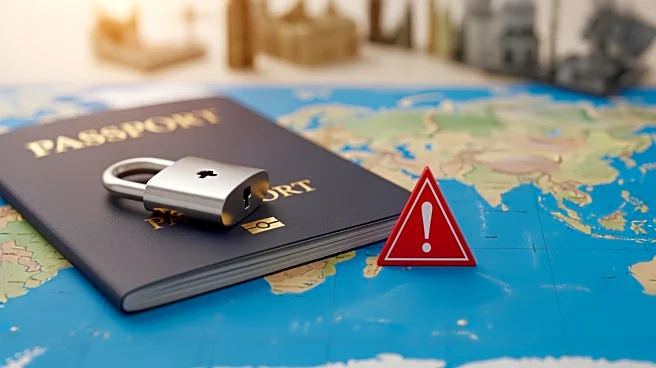What's Happening?
An Iranian American man, Kamran Hekmati, is currently detained in Tehran's Evin Prison due to charges related to a trip he made to Israel 13 years ago. Hekmati, who is Jewish, traveled to Israel to celebrate
his son's bar mitzvah, an act that is prohibited under Iranian law. His detention was first reported by the New York Times and confirmed by a family member to NBC News. Hekmati, who is 70 years old and battling bladder cancer, was arrested in July after several interrogations during a personal visit to Iran. The State Department has reiterated its warning to Americans about the risks of traveling to Iran, highlighting the potential for questioning, arrest, and detention, especially for those with U.S. connections.
Why It's Important?
The detention of Kamran Hekmati underscores the ongoing risks faced by U.S. citizens traveling to Iran, particularly those with dual nationality or connections to the U.S. The State Department's warning reflects broader concerns about Iran's history of detaining foreign nationals, which can complicate diplomatic relations and impact international travel advisories. The situation highlights the precarious position of Iranian Americans and other dual nationals who may face legal repercussions due to Iran's strict laws and political tensions. This case may influence U.S. foreign policy and diplomatic efforts to secure the release of detained citizens.
What's Next?
The family of Kamran Hekmati is hopeful for his release on humanitarian grounds due to his poor health condition. The State Department continues to engage with allies and partners to address cases of unjust detention in Iran. The situation may prompt further diplomatic discussions and negotiations aimed at securing the release of Hekmati and other detained Americans. The Iranian regime's response and potential willingness to negotiate could impact future travel advisories and diplomatic relations between the U.S. and Iran.
Beyond the Headlines
The detention of Kamran Hekmati raises ethical and legal questions about the treatment of dual nationals and the application of Iranian law to foreign citizens. It highlights the cultural and political challenges faced by individuals with ties to both the U.S. and Iran, and the broader implications for international human rights advocacy. The case may also influence public perception and policy discussions regarding travel restrictions and diplomatic strategies in dealing with countries known for detaining foreign nationals.










